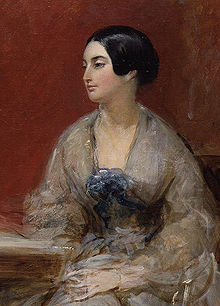- Tender years doctrine
-
The tender years doctrine is a legal principle which has existed in family law since the late nineteenth century. This common law doctrine presumes that during a child's "tender" years (generally regarded as the age of thirteen and under), the mother should have custody of the child. The doctrine often arises in divorce proceedings.
History
Historically the English Family Law gave custody of the children to the father, in case of divorce. Until the nineteenth century the women had few individual rights, most of their rights being derived through their fathers or husbands. In the early nineteenth century, Mrs. Caroline Norton, a prominent British society beauty, feminist, social reforment author, and journalist, began to campaign for the right of women to have custody of their children. Norton, who had undergone a divorce and been deprived of her children. So, she worked with the politicians of those times and eventually was able to convince the British Parliament to enact legislation to protect mothers' rights. The result was the Custody of Infants Act from 1839 , which gave some discretion to the judge in a child custody case and established a presumption of maternal custody for children under the age of seven years. In 1873 the Parliament extended the presumption of maternal custody until a child reached sixteen years of age.[1]. This doctrine spread then in majority of the states of the world as England was controlling a wide empire. By the end of the 20th century this doctrine was abolished in the majority of the states of USA and Europe.
Tender years doctrine application
In United States
Tender years doctrine was also frequently used in the 20th century being gradually replaced towards the end of the century, in the legislation of most states, by the "best interests of the child" doctrine of custody. Furthermore, several courts have held that the tender years doctrine violates the equal protection clause of the Fourteenth Amendment to the U.S. Constitution.
In Europe
The Tender Years doctrine was gradually abolished in the majority of the states of the EU. In those states the joint custody is the rule after divorce or the separation of the parents. The Principles of the European Fammily Law regardign the parental responsibilities mention in clear that the two parents are equal and their parental responsibilities should neither be affected by the dissolution or annulment of the marriage or other formal relationship nor by the legal or factual separation between the parents.[2]
Maternal Preference versus Tender Years Doctrine
Critics of the family court system, and in particular father's rights groups, contend that although the tender years doctrine has formally been replaced by the best interests of the child rule, the older doctrine is still, in practice, the means by which child custody is primarily determined in family courts nationwide. Statistics such as those from the U.S. Census Bureau [3] indicate that family courts still demonstrate an overwhelming preference to place the children of a divorce in the custody of the mother. A study of FACT Canada association shows the mothers is awarded the sole custody or the primary residence in more than 80% of the cases[4]. The situation is not much different in EU countries, for example in Romania the mother is granted custody in over 84.5% of the cases [5].
Critics maintain that the father must prove the mother to be an unfit parent before he is awarded primary custody, while the mother need not prove the father unfit in order to win custody herself, and that this is contrary to the equal protection clause.
Bibliography
- Bookspan, Phyllis T. 1993. "From a Tender Years Presumption to a Primary Parent Presumption: Has Anything Really Changed? … Should It?" Brigham Young University Journal of Public Law 8 (January).
- Katz, Sanford N. 1992. "'That They May Thrive' Goal of Child Custody: Reflections on the Apparent Erosion of the Tender Years Presumption and the Emergence of the Primary Caretaker Presumption." Journal of Contemporary Health Law and Policy, Catholic University 8 (spring).
- McLain, Lynn. 1997. "Children Are Losing Maryland's 'Tender Years' War." University of Baltimore Law Review 27 (fall).
- Pica, Derek A. 1999. "The Tender Years Doctrine: Is It Still the Law?" Advocate (Idaho) 38 (January).
- Radke, Lynn E. 1993. "Michigan's New Hearsay Exception: The 'Reinstatement' of the Common Law Tender Years Rule." University of Detroit Mercy Law Review 70 (winter).
- Rinella, Lori. 1995. "Children of Tender Years and Contributory Negligence." UMKC Law Review 63 (spring).
- Child Custody and Parental Authority in France, Louisiana and Other States of the United States: A Comparative Analysis by Christopher L. Blakesley (link)
See also
Links
- Tender Years Doctrine on TheFreeDictionary.Com
- Criteria for Custody Awards
- http://www.spartacus.schoolnet.co.uk/Wcustody39.htm
- http://digital.library.upenn.edu/women/norton/nc-biography.html
Notes
- ^ http://legal-dictionary.thefreedictionary.com/Tender+Years+Doctrine
- ^ The document is issued by Commission on European Family Law and can be consulted here. See Principle 3:10.
- ^ US Census - Custodial Mothers and Fathers and Their Child Support: 2001 [1] October 2003
- ^ http://www.fact.on.ca/judiciary/spin.pdf
- ^ http://www.monoparentalitate.ro/uploads/files/studiu-cnps_oaai.pdf
Categories:- United States law stubs
- Legal doctrines and principles
- Family law
Wikimedia Foundation. 2010.

